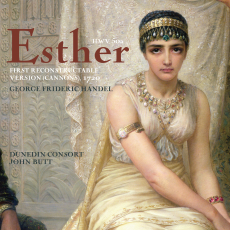Esther - Dunedin Consort - Gramophone
Dunedin Consort record the second incarnation of Esther Somewhere between a masque and a fully fledged oratorio, Esther is a problematic work. John Arbuthnot's adaptation of Racine's play is ill-proportioned and leaves too many lacunae in the narrative, while Handel's music, liberally pilfered from his Brockes-Passion, can mesh uncomfortably with character and action. After the intimacy of the first two acts, the brass-festooned splendour of the Jewish choruses in Act 3 seems to belong to a different work. In a way it does. Recent research by John Roberts has revealed that Esther went through two stages: a version of 1718, now lost, composed for the same chamber forces as Acis and Galatea; and an expanded revision of 1720, taking advantage of the newly enlarged forces at Cannons, the Duke of Chandos's Palladian mansion in what was then rural Edgware. Whatever its faults as drama, Esther does contain some superb music, especially for the chorus and the characters who most fired Handel's imagination: the Persian King Assuerus (married to the Jewess Esther) and his henchman Haman, intent on a Jewish massacre. For this recording John Butt has drawn on Roberts's research to create an edition that differs in various minor ways from the versions recorded by Hogwood and Christophers. Inter alia, the action is, convincingly, divided into three acts rather than six scenes, and a flute, indicated in Handel's autograph, is added to the harp obbligato in the aria ‘Praise the Lord'. As on his recordings of Acis and Galatea (1/09) and Messiah (12/06), Butt's direction combines spontaneous freshness with a care for expressive phrasing and precise colouring. The 11-strong chorus - the solo cast plus reinforcements - is vital and incisive, packing a fair punch even in the ceremonial final chorus. Of the soloists, James Gilchrist's characteristically intense, involved Assuerus and Matthew Brook's baleful Haman are at least a match for their counterparts on the rival recordings. Indeed, Brook's noble singing of Haman's (futile) plea for mercy to Esther and his admonitory final aria give the oratorio's villain a near-tragic grandeur. Thomas Hobbs sings ‘Tune your harps' gracefully, abetted by the eloquent oboist Alexandra Bellamy; and the more robust, baritonal Nicholas Mulroy makes his mark in Mordecai's solo. Any venom here comes courtesy of the strings. So much in Butt's carefully prepared performance feels exactly right.


